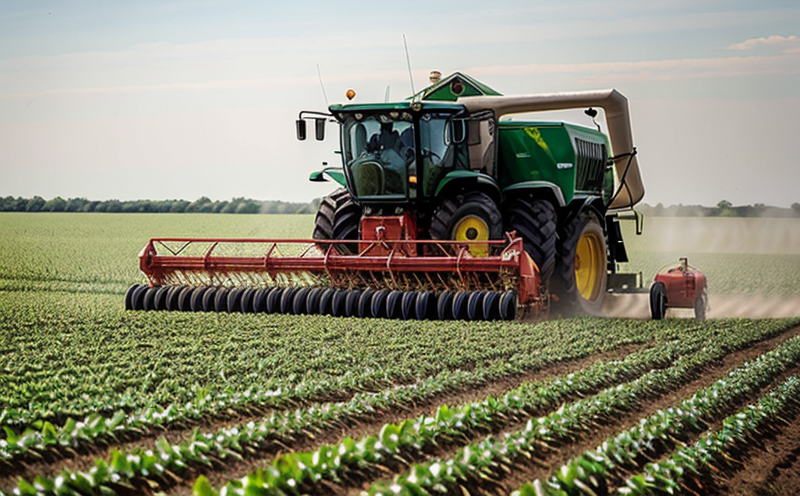Comprehensive Crop Productivity Assessment
The Comprehensive Crop Productivity Assessment (CCPA) is a robust and detailed evaluation that ensures optimal crop yield and productivity. This service goes beyond basic agronomic analysis to provide a comprehensive understanding of the environmental, genetic, and management factors influencing crop performance.
At its core, CCPA involves an intensive field survey, laboratory testing, and statistical analysis aimed at identifying key variables affecting crop health and output. The process begins with detailed site visits where soil samples are collected, plant growth stages are observed, and irrigation and fertilization practices are noted.
Laboratory analyses include a wide array of tests such as nutrient content determination (NPK levels), pH measurement, organic matter analysis, and microbial activity assessment. Additionally, we use advanced imaging techniques to assess leaf area index, chlorophyll content, and photosynthetic efficiency. These metrics provide critical insights into the health of the crops under study.
The data collected is then subjected to rigorous statistical methods to correlate environmental conditions with crop performance. This approach helps in pinpointing specific areas where improvements can be made to enhance yield and productivity. For instance, if certain soil types are shown to limit growth, recommendations for soil amendment or different plant varieties may be suggested.
The CCPA also includes a review of agronomic practices such as planting density, rotation cycles, and pest management strategies. By integrating these findings with the laboratory results, we can offer tailored solutions that address not only current issues but also potential future challenges. This holistic approach ensures that our clients receive actionable insights which are essential for sustainable agricultural practices.
Our team of experts uses state-of-the-art equipment and follows internationally recognized standards such as ISO 17025 to ensure accuracy and reliability in all assessments. The ultimate goal is to provide decision-makers with the information they need to make informed choices that lead to improved crop performance and sustainability.
Why Choose This Test
Selecting the Comprehensive Crop Productivity Assessment can be a strategic move for any organization involved in agriculture or forestry. Here are several reasons why this test is advantageous:
- Precise Data Collection: The CCPA utilizes advanced tools and techniques to gather precise data, ensuring that every aspect of crop health and productivity is covered.
- Rigorous Standard Compliance: Our processes adhere strictly to international standards like ISO 17025, guaranteeing the highest level of accuracy and reliability in our findings.
- Tailored Recommendations: Based on detailed analysis, we provide customized recommendations that are specific to your particular crop and local conditions.
- Sustainable Practices: By focusing on sustainable agricultural practices, this assessment helps reduce environmental impact while boosting yields.
In addition to these benefits, the CCPA also facilitates better resource management by optimizing inputs like water, fertilizer, and labor. This not only enhances productivity but also contributes to cost efficiency for our clients.
Customer Impact and Satisfaction
The Comprehensive Crop Productivity Assessment has a profound impact on customer satisfaction across various sectors including quality managers, compliance officers, R&D engineers, and procurement professionals. Here’s how it translates into tangible benefits:
- Informed Decision Making: With comprehensive data at their disposal, decision-makers can make well-informed choices that lead to higher productivity.
- Enhanced Compliance: By adhering closely to international standards and providing verifiable results, our clients ensure they meet all necessary regulatory requirements.
- Promotion of Sustainability: The focus on sustainable practices not only aids in environmental protection but also enhances brand reputation among consumers who value eco-friendly products.
- Better Resource Utilization: Efficient use of resources such as water and fertilizers directly translates into cost savings for the business.
Customer satisfaction is further enhanced by our commitment to delivering accurate, reliable results within agreed timelines. Regular feedback from clients reinforces our efforts towards continuous improvement in service quality.
Use Cases and Application Examples
The Comprehensive Crop Productivity Assessment finds application in diverse scenarios ranging from large-scale commercial farms to smallholder operations. Here are some illustrative examples:
- Commercial Farms: Large-scale farmers benefit greatly from CCPA as it helps them optimize resource use, improve yields, and comply with stringent regulatory standards.
- Farmers' Cooperatives: By pooling resources and sharing knowledge gained through CCPA, cooperatives can enhance collective performance significantly.
- Research Institutions: Academic institutions often rely on CCPA to validate theories and develop new methodologies in agricultural science.
- Schools & Universities: Educational institutions use CCPA findings for teaching practical aspects of agriculture and forestry.
In each case, the assessment plays a crucial role in driving innovation and efficiency within the agricultural sector. It serves as both a diagnostic tool and a roadmap for future improvements.





